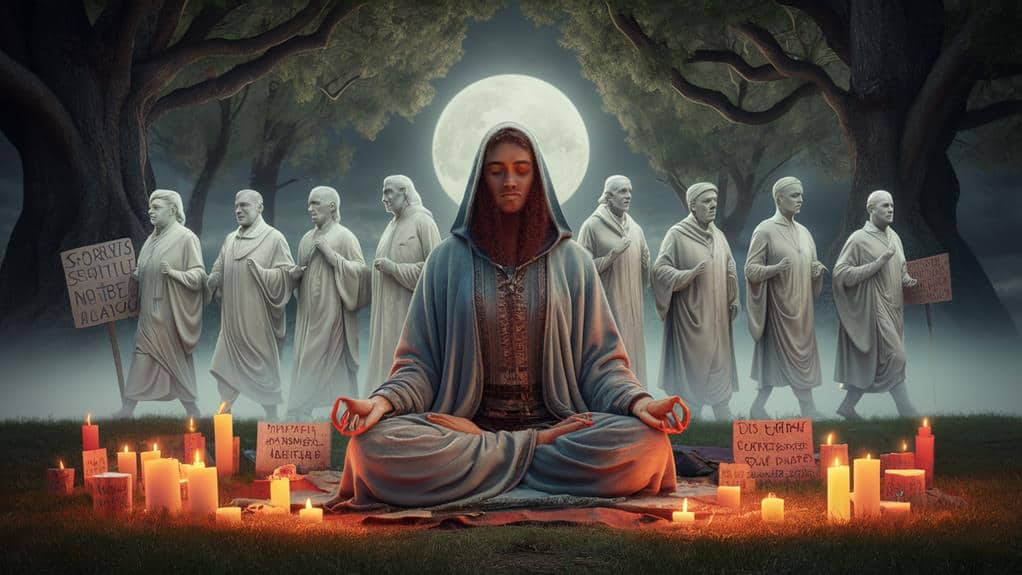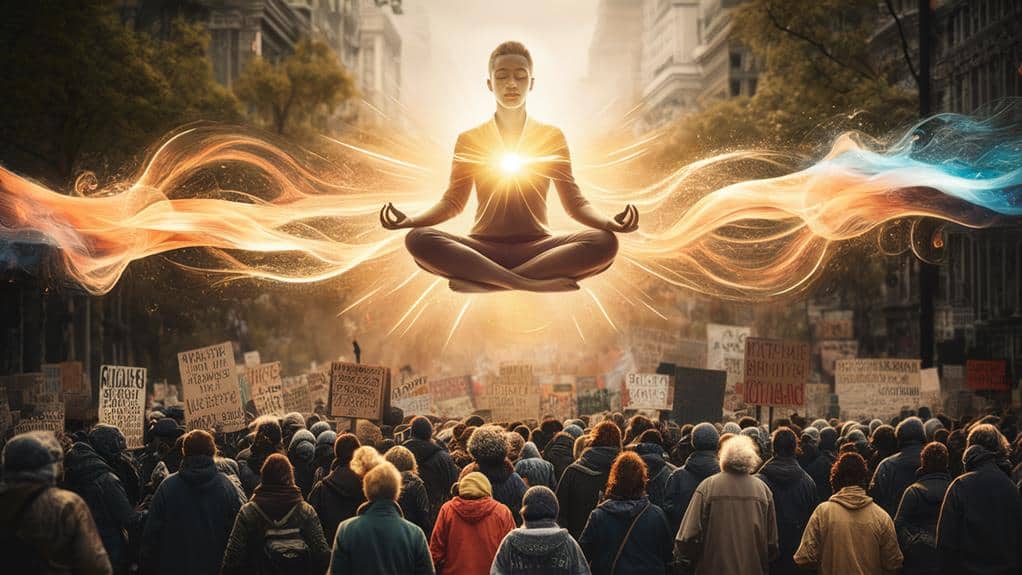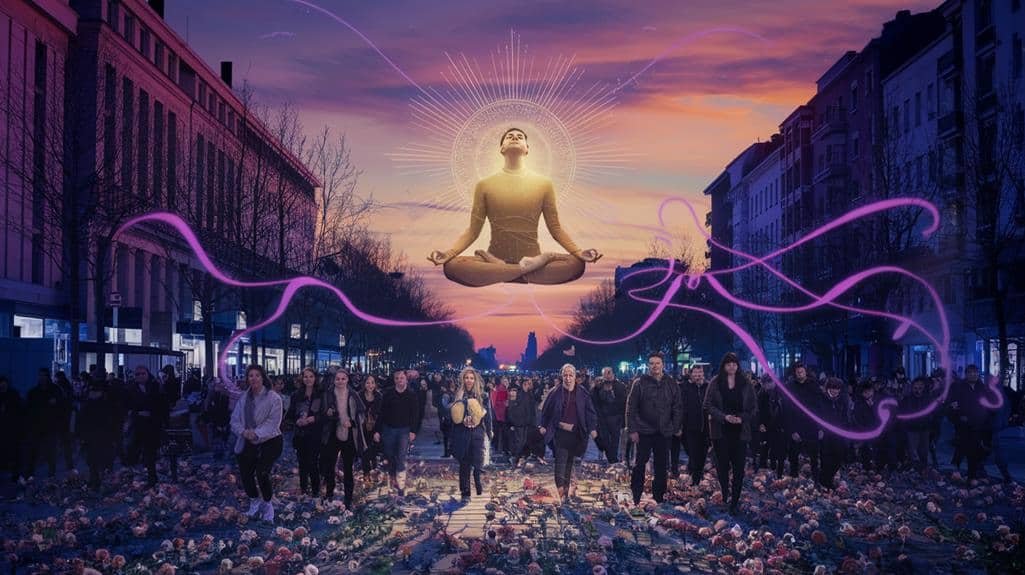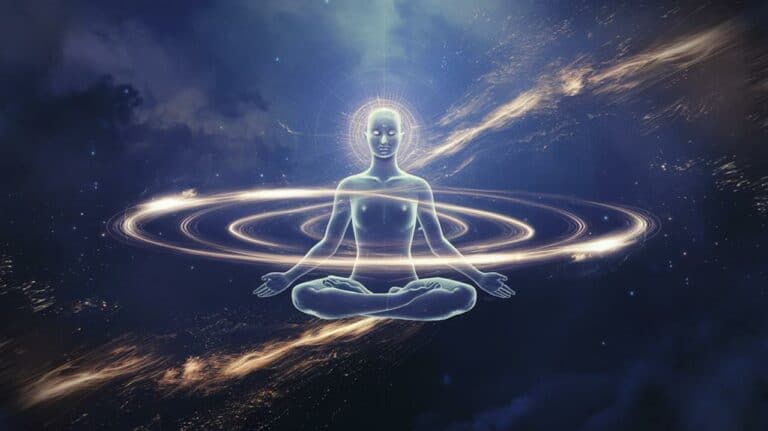Mysticism and Social Activism
You’ll find a profound paradox at the heart of social transformation: the most effective agents of change often draw their power from stillness. While you might think mysticism and activism exist in separate spheres—one focused inward, the other outward—history reveals their deep interconnection. From Martin Luther King Jr.’s contemplative practices to Dorothy Day’s spiritual discipline, the greatest social reformers have merged inner work with outer action. This marriage of mysticism and activism isn’t just historical coincidence; it’s a dynamic force that continues to shape movements for justice, suggesting there’s more to discover about this powerful alliance.
Historical Roots of Spiritual Activism

While many view mysticism and social activism as separate domains, their intertwining dates back to ancient religious movements that sparked societal change. You’ll find this profound connection in the lives of prophets who challenged oppressive systems while maintaining deep spiritual practices, creating ripples that transformed entire civilizations.
Throughout history, you’ve inherited a legacy where contemplatives didn’t just retreat to monasteries – they emerged as powerful voices for justice. Consider how medieval mystics like Meister Eckhart challenged institutional corruption while exploring divine unity, or how Sufi poets wove social critique into their spiritual verses.
You’re part of a tradition where inner transformation has catalyzed outer revolution. When you look closely at Christianity’s abolitionists, Buddhism’s engaged practitioners, or Hinduism’s reformers, you’ll notice a pattern: their mystical experiences didn’t separate them from worldly concerns but rather deepened their commitment to social change.
They’ve shown you that the path to liberation isn’t just personal – it’s profoundly collective. Their wisdom reveals that authentic spirituality naturally flows into compassionate action, transforming both individual consciousness and social structures.
Meditation in Social Movements
Modern social movements have embraced meditation as a powerful tool for sustaining activism and fostering collective change. You’ll find that contemplative practices are woven into protests, community organizing, and social justice work, offering you a way to maintain resilience while confronting systemic oppression.
When you’re engaged in the demanding work of social transformation, meditation serves as your anchor, helping you navigate the intense emotions and burnout that often accompany activism. You’ll discover that movements like Black Lives Matter and climate justice initiatives have integrated mindfulness practices into their organizing strategies, creating spaces where you can ground yourself while building solidarity with others.
Through meditation, you’re able to cultivate the inner strength needed for long-term commitment to social causes. You’ll notice how regular practice enhances your capacity for compassionate action while maintaining emotional equilibrium in the face of resistance.
Whether you’re participating in direct actions or engaging in community building, meditation provides you with tools to stay centered, think strategically, and connect authentically with fellow activists who share your vision for a more equitable world.
Sacred Resistance Through Time
Throughout history, sacred resistance movements have merged spiritual practices with social rebellion to challenge oppressive systems. You’ll find this sacred thread woven through countless uprisings, where mystics and activists have joined forces to confront injustice through both inner transformation and outer action.
From medieval peasant revolts guided by radical priests to India’s independence movement led by Gandhi’s spiritual philosophy, you’re witnessing a timeless pattern of devotion fueling defiance.
When you examine this phenomenon closely, you’ll discover how contemplative practices have strengthened resisters’ resolve while providing ethical frameworks for their actions.
Consider how Tibetan monks have maintained their cultural identity through meditation and protest, or how Black churches served as spiritual anchors during the Civil Rights Movement.
You’re part of this continuing legacy where prayer meets protest, where ancient wisdom traditions empower modern struggles for justice.
In these sacred resistance movements, you’ll find that spiritual practices don’t just comfort the oppressed—they transform consciousness and catalyze collective action, creating a powerful alchemy that’s sustained freedom fighters through centuries of struggle.
Modern Contemplative Justice Warriors
Today’s contemplative justice warriors carry forward the torch of sacred resistance, blending ancient spiritual wisdom with contemporary activism. You’ll find them meditating before protests, grounding their actions in deep spiritual practice while confronting systemic injustice.
They’re drawing from traditions like engaged Buddhism, prophetic Christianity, and Indigenous spirituality to forge a path that’s both inwardly reflective and outwardly transformative.
As you explore this emerging movement, you’ll discover practitioners who understand that inner work and outer change aren’t separate pursuits. You’re witnessing a generation that’s learned to hold both contemplation and action as sacred duties.
They’re showing up at climate rallies with prayer beads, leading mindfulness sessions in occupied spaces, and bringing spiritual depth to social justice organizations.
Their approach transforms traditional activism by infusing it with contemplative practices that sustain long-term commitment and prevent burnout.
You’re seeing them create new forms of resistance that honor both the mystical and the practical, understanding that true change requires both the transformation of consciousness and concrete action in the world.
Inner Peace Meets Direct Action

At the intersection of serenity and protest lies a powerful synthesis of contemplative practice and direct action. When you’ve cultivated inner stillness through meditation and mindfulness, you’ll find yourself uniquely equipped to engage in social justice work with both passion and equanimity.
You’re able to approach confrontation with a centered presence that transforms angry reactions into purposeful responses.
You’ll discover that your spiritual practice doesn’t separate you from the world’s struggles but rather deepens your capacity to engage with them. As you move through protests or organize community actions, you’re bringing the groundedness of your inner work into each step, each chant, each act of resistance.
Your meditation cushion becomes as essential as your protest sign; your breath awareness as important as your voice raised in solidarity.
This integration allows you to stand firmly in chaos without being consumed by it. You’re developing what the ancients called “engaged detachment” – fully present in the struggle while maintaining the spacious awareness that prevents burnout and sustains your commitment to long-term transformation.
You’re becoming both warrior and witness, activist and sage.
Faith-Based Community Organizing
Faith-based community organizing harnesses the power of religious institutions to create lasting social change.
When you mobilize the spiritual capital within congregations and faith networks, you’ll tap into centuries-old traditions of social justice and moral authority. You’re not just building coalitions; you’re awakening the dormant potential of sacred spaces to address systemic inequities and transform communities.
In this profound intersection of faith and action, you’ll discover that religious institutions offer unique resources – physical gathering spaces, established trust networks, and deeply rooted moral frameworks.
You’re connecting with people through their deepest values, where social justice isn’t just political but profoundly spiritual. Whether you’re organizing interfaith initiatives or working within a single tradition, you’ll find that faith communities possess an extraordinary capacity to sustain long-term movements for change.
Mindfulness for Social Change
While faith communities mobilize collective action, mindfulness practices empower individuals to become more effective agents of social change from within. You’ll discover that cultivating present-moment awareness transforms how you engage with social justice work, allowing you to respond to injustice with clarity rather than react from trauma or unconscious bias.
Through mindfulness, you’ll develop the emotional resilience needed to sustain long-term activism without burning out. You’re learning to observe your thoughts and feelings about social issues without becoming overwhelmed, which helps you make more strategic decisions in your advocacy work.
As you deepen your practice, you’ll notice how interconnected personal transformation and social change truly are.
When you bring mindfulness into your activism, you’re better equipped to listen deeply to those affected by systemic oppression, build authentic relationships across differences, and maintain hope in the face of setbacks.
Your meditation cushion becomes a launching pad for skilled action in the world, as you learn to balance inner peace with outer engagement, transforming contemplation into compassionate service for the collective good.
Transforming Self and Society
Through dedicated inner work, personal transformation inevitably ripples outward to create social change. As you cultivate awareness and deepen your understanding of consciousness, you’ll discover that the boundaries between self and society begin to dissolve, revealing their inherent interconnection.
Your internal shifts – whether through meditation, contemplative practice, or spiritual inquiry – naturally influence your relationships, choices, and actions in the wider world.
You’ll find that transforming society isn’t separate from transforming yourself. When you heal your own wounds, you’re better equipped to help others heal. When you face your shadows, you’re more capable of addressing collective shadows.
As your consciousness expands, you’ll notice how your presence alone can catalyze change in others, creating subtle yet powerful shifts in group dynamics and social interactions. Your growing authenticity and inner peace will inspire those around you to examine their own lives more deeply.
You’re not just changing yourself – you’re participating in humanity’s collective evolution. Each step you take toward greater awareness contributes to the larger field of consciousness that shapes our shared reality.









